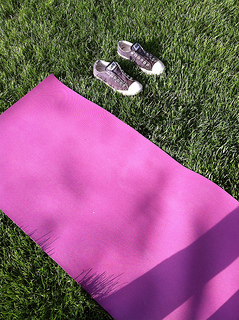 “Remember to stay on your own yoga mat,” the yoga instructor said as I, and the members of my yoga class, held the “warrior” pose. “Don’t compare yourself to others. This is your yoga practice, not someone else’s.”
“Remember to stay on your own yoga mat,” the yoga instructor said as I, and the members of my yoga class, held the “warrior” pose. “Don’t compare yourself to others. This is your yoga practice, not someone else’s.”
After that comment, I made a concerted effort to avoid sneaking a peek at the super-fit, super-flexible (and of course, drop-dead gorgeous) yogini student to my right. I had a feeling that whatever I saw would cause my jaw to drop in awe and envy (perhaps in a new yoga pose – “Dropped Jaw”?) Instead, I spent the rest of the class dutifully focused on my own positioning, breathing, and intention.
Of course, we can’t go through life studiously ignoring other people who may cause us to “compare and despair.” As we think about our work, our careers, and especially when we grapple with what’s next for us, we can’t help but notice what other people have accomplished, the dream jobs they have landed, the kind of lifestyle they have attained. We may find ourselves feeling envious.
Rather than pretending that envy is an emotion that never afflicts us, I find it’s helpful to make friends with envy. It can be very useful.
What is envy telling you?
Envy usually has a hidden message for us:
- It can be a message about what is lacking in your life, career, or job.
- It can help you discern what you really want.
- It can be a reminder that you are capable of more, better, or different than what you are doing/being right now.
And yet, envy does not tell the whole story. When we envy something that someone else has — be it a job or career path, a house, a relationship, material wealth, a vacation, an award, an adventure — we are usually fixated on the object of our envy, and not looking at the whole picture of that person’s life. Sure, they have a high-profile job that they’re great at, but do they have a fulfilling personal life, good health, and/or work/life balance? And even when people seem to us to “have it all,” we usually have no idea what is truly going on behind the scenes.
From “compare and despair” to “admire and aspire”
So rather than get caught in a downward spiral of “compare and despair,” I suggest we try to “admire and aspire.” When you see something that someone else possesses or has attained, here are three things you can do:
1. Figure out what it is about the thing that you envy that is so attractive. Get specific. For example, if you envy a former colleague’s promotion, identify what exactly is enviable about it. Is it the prestige of the new position? The higher level of authority to make decisions in the organization? The larger budget? The opportunity to make an impact? The ability to work with a certain type or group of people? The more flexible hours, promising better work/life balance? The salary and benefits package? The travel opportunities? The executive assistant?
2. Having honed in on the specific aspect of what you envy, think about how exactly you would like to have that in your life. Chances are, you don’t want an exact replica of the situation of the person you envy. Adapt that desired element to your own life situation.
3. Ask yourself, “What are some actions I can take to begin to bring this desired thing into my life?” Rather than getting stuck in the feeling of envy, turn that into action. Shift from envy to inspiration. Brainstorm some baby steps that you could actually take this week, and this month, so that you don’t get overwhelmed and see your goal as unattainable. For example: interview the envied individual about how they got to where they are and how they like it; do some Google research on the thing you aspire to; identify what strengths you have that align with your goal.
Photo by Average Jane


{ 4 comments… read them below or add one }
Thanks, Shana! This is a good read with a great message. I am trying so many new things lately and not feeling very good at any of them – quite humbling, actually. I look at people and wonder – how to they do (think, look, act, insert verb here) that?? I like how you break it down and will try some of this in practice. Carry on with the good work! Kristen
Good for you, Kristen, to try so many new things! It can be a very uncomfortable feeling to be doing something that you are not (yet) very good at, especially when you are accustomed to doing things you *are* good at. There’s a model of learning that talks about the 4 stages of learning, and the second stage, “conscious incompetence” can be particularly tough. (I wrote about it here: http://developmentcrossroads.com/2011/09/what-you-never-learned-in-school-about-learning/ ) What we need at that stage is to be gentle with ourselves, and find a safe space to make mistakes. It may also help to realize that although the people we are observing in wonder and envy seem to do that thing so effortlessly (they’re in stage 4 of the learning process), there may be other things that they are not so good at that come more easily to us.
More power to you as you try new things!
Thanks, it helps to put things into perspective!
Glad you found it helpful, Aurelia!